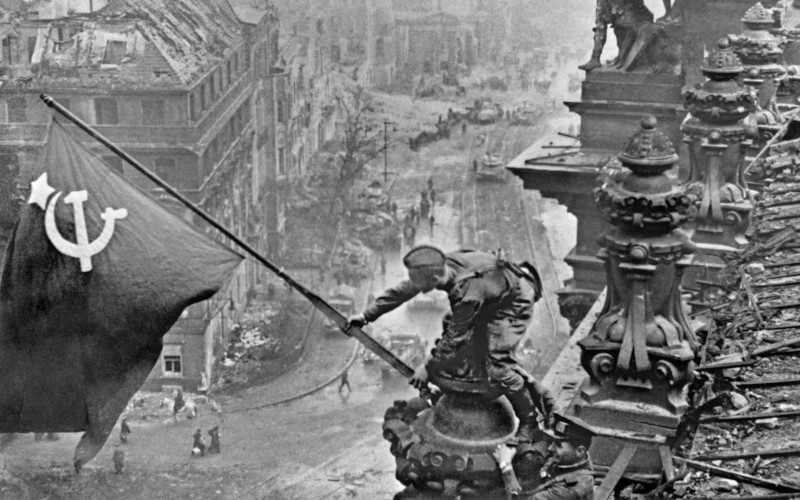
One of the most important ways to combat the rewriting of history is to create a common media platform with a list of names of all participants in the Great Patriotic War. About this in the material of Yana Osipova.
On January 26–27, 2023, the Eurasian Peoples' Assembly held the 23rd International Public Forum on Preserving the Memory of World War II and the Great Patriotic War. The first day of the event was held on the basis of the Crimean Federal University in Simferopol, the second was held at the headquarters of the Eurasian Peoples' Assembly in Moscow.
The online forum was attended by historians, public figures and leaders of search organizations from seven countries: Russia, Belarus, Kyrgyzstan, Kazakhstan, Abkhazia, Slovenia and Israel.
During the speeches and discussions the experts agreed that the most urgent task today is to preserve the historical truth in memory, counteract the falsification of the results of the Second World War and the Great Patriotic War, and also instill in young people a sense of belonging to the feat of the older generation.
A single database containing information about the fallen soldiers of the Great Patriotic War is very relevant, it should be the same for everyone and work at the international level, the forum participants emphasized.
The co-organizer of the forum, president of the Alliance Media National Business Partnership, Igor Gorodnichiy, acknowledged the problem of the fragmentation of resources and systems: "Each region has its own memory books. They are not united. Resources must be collected, combined and digitized."
Professor of political science, academician, historian from Kazakhstan Laila Akhmetova recalled the Network of History media platform (a project of the Eurasian Peoples' Assembly, implemented in partnership with Alliance Media). This is a public movement in support of the creation of International Associations of descendants of participants in Soviet military fronts, units, as well as participants in the most important historical battles. The platform has been operating for a little over six months, its goal is to name all the participants in the Great Patriotic War. At the moment, it is available only to those who enter data there.
“Volunteers are very much needed for data entry. My life is not enough to digitize everything that we have found,” says Laila Akhmetova.
Laila Akhmetova is engaged in the work of establishing the names and fates of the defenders of the Brest Fortress of Kazakh origin.
“I have already found 637 defenders from Kazakhstan, although only 29 people were declared according to official documents. I personally entered the data of 452 defenders of the Brest Fortress into the Network of History media portal,” Akhmetova said.
Akhmetova's compatriot, deputy commander of the search detachment "Maidan Zholy" Sergey Fedorenko also spoke at the forum. He said that in Kazakhstan there are only 9 detachments that are searching for the burial places of soldiers who died during the Great Patriotic War. The geography of their work is quite extensive. Over the past two years, they have traveled in search of Russia, Belarus and Moldova. He also recalled the activities of the search "team of the USSR", which includes more than 50 people. All of them are natives of the CIS countries.
The most honored guest of the forum was a veteran, defender of the Brest Fortress, Vladimir Ilyich Tyomochkin.
“We cannot hear the slander that is being poured about our history. We really won and fought. It is impossible to destroy it. It is impossible to destroy the memory of every third resident of Brest who died during the siege of the fortress,” the veteran shared.
The chairman of the Brest city organization the Association of Veterans, Anna Onischuk, who arrived with the veteran, said that when entering Poland from Belarus, one sees banners depicting destroyed monuments in Poland set up by active citizens.
“This is inhuman and unfair, and we want to remind the Poles of this. What a pity that our history is being rewritten,” Anna complained. She also proposed the idea of "memory trains" aimed at preserving historical memory. It is assumed that they will take young people to the most significant places in history: the Leningrad Road of Life, the Brest Fortress, Khatyn.
Janez Ujcic (Slovenia), the director of the only international research center of the Second World War in Maribor in Europe, also spoke at the forum. His team found and identified more than 3,000 names of the 5,000 Soviet prisoners of war who died in the Maribor camp from 1941 to 1942.
“We also identified the entire Nazi team that worked in the Maribor camp during these years. It was convicted during the Nuremberg trials. It is important that in the coming year we’ll find data on other prisoners of war,” Janez said.
He stressed that his center stands for opposition to the distortion of history and the revival of neo-Nazism.
Natalia Bodrova, a searcher, senior lecturer at the Oryol State Institute of Culture, reminded the forum participants of the anniversary of the 16th Lithuanian Klaipeda Rifle Division, which took part in the liberation of Lithuania. February 21 marks the 80th anniversary of the division's entry into its first battle. To date, 3416 names of members of this division have been identified and entered into the database.
In conclusion, Andrei Belyaninov, Secretary General of the Eurasian Peoples' Assembly, recalled that people from Bishkek, Almaty and Tashkent fought in the Panfilov division.
“We won together in World War II and Patriotic War. We must not forget about all our allies. Only by uniting did we reach Victory. And now we must stick together,” says Belyaninov.


